Goats are not only adorable and curious animals, but they also provide valuable resources like milk, cheese, and even natural household products. Whether you’re raising goats on a large farm or in a small suburban backyard, proper nutrition is vital for their health and productivity.
This guide will help you understand “what can goats eat?” and how to manage their diet effectively to ensure they thrive in any environment.
Understanding their dietary needs, safe foods, and common feeding mistakes will keep your goats happy, healthy, and productive.
Let’s dive into the details of a balanced goat diet.
Key Takeaways:
- Balanced Diet is Crucial: Goats require a balanced diet consisting mainly of forage, including grasses and hay, with some grains, vegetables, and mineral supplements for optimal health.
- Safe Foods for Goats: Goats can safely eat a variety of grasses, hay, vegetables, and fruits in moderation. Grains can be part of their diet but should be limited to avoid health issues like obesity and bloat.
- Avoid Toxic Foods: Some plants, like azalea, rhododendron, and oleander, along with human foods like chocolate, onions, and garlic, are toxic to goats and should be avoided at all costs.
- Hydration is Key: Goats need access to fresh, clean water at all times, as water is essential for digestion, milk production, and overall well-being.
- Tailored Feeding for Different Stages: Nutritional needs vary for baby goats, adult goats, and pregnant or lactating goats, so their diet should be adjusted accordingly to support growth, reproduction, and milk production.
Basic Nutritional Needs of Goats
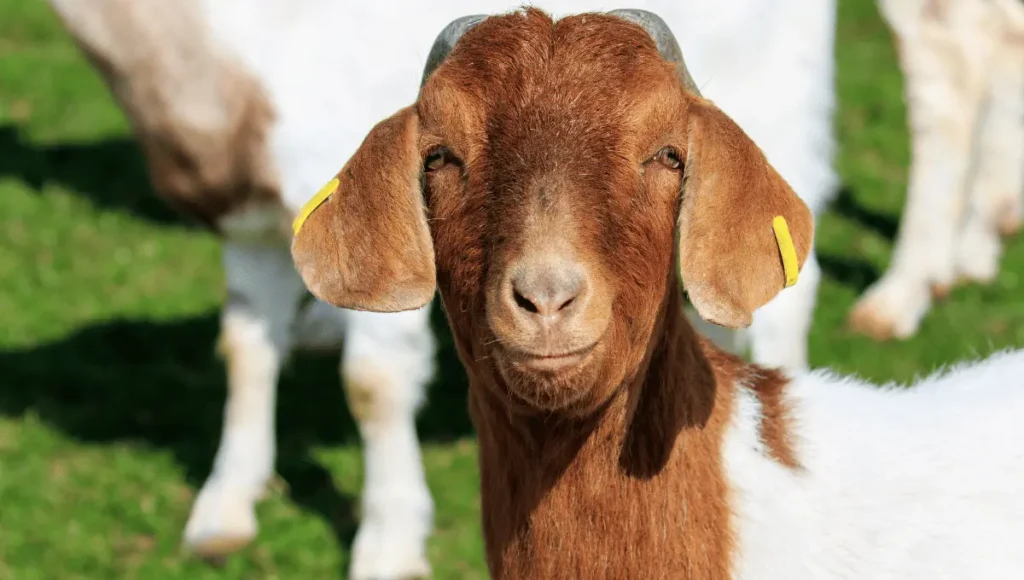
Essential Nutrients for Goats
Just like humans, goats require a balanced diet rich in essential nutrients. Their diet should include proteins, carbohydrates, fats, vitamins, and minerals to keep them healthy and energetic.
Protein is especially important for growth, milk production, and muscle development. For young kids or lactating, a higher protein content is needed.
Carbohydrates and fats serve as the primary energy sources, ensuring that goats maintain a healthy weight and stay active.
Vitamins such as A, D, and E, along with minerals like calcium and phosphorus, are critical for strong bones, reproductive health, and overall well-being.
Water Requirements for Goats
Water is an often overlooked yet vital part of a goat’s diet. Goats should always have access to fresh, clean water. A lack of water can lead to dehydration, poor digestion, and a decrease in milk production for lactating.
On average, goats drink between 2 to 4 gallons of water per day, depending on the weather, activity level, and lactation status.
Safe Foods for Goats
Common Grasses and Forage
Goats are natural grazers and enjoy a wide variety of grasses and forage as the base of their diet. Pasture grasses such as Bermuda, Timothy, and Ryegrass are great options for goats.
In addition to pasture, hay plays a crucial role, especially during winter months when fresh pasture may not be available.
Timothy, clover, and alfalfa hay are highly nutritious, providing fiber, energy, and minerals. Alfalfa is especially beneficial for dairy goats due to its high protein and calcium content.
Vegetables and Fruits Goats Can Eat
In addition to forage, goats can enjoy a variety of vegetables and fruits as treats. Safe vegetables for goats include carrots, cucumbers, and lettuce, while fruits such as apples, bananas, and pears provide a tasty and healthy snack.
These should be offered in moderation, as too much fruit or vegetable matter can upset their stomachs. Always make sure to remove any seeds or pits, as they can be harmful to goats.
Grains and Supplements
Grains, such as oats, barley, and corn, can be fed to goats to provide extra energy, especially in colder months or during pregnancy and lactation.
However, grains should be fed in moderation to avoid obesity or digestive issues like bloat. Mineral blocks or loose minerals specifically formulated for goats are also essential for providing the nutrients that may be lacking in forage or hay.
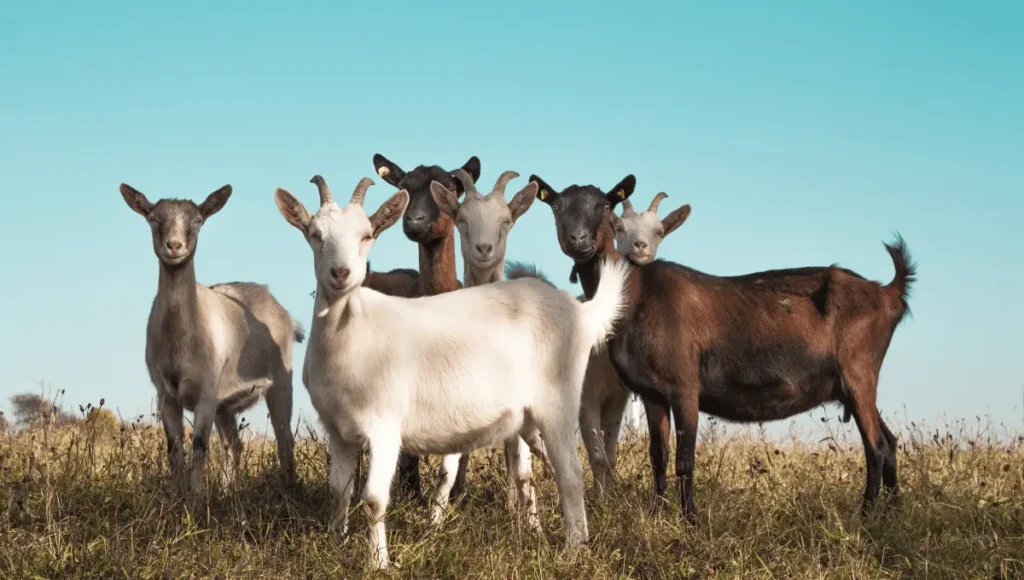
| Safe Foods for Goats | Examples |
| Grasses and Forage | Bermuda grass, Timothy grass, Ryegrass |
| Vegetables | Carrots, Cucumbers, Lettuce |
| Fruits | Apples (no seeds), Bananas, Pears |
| Grains | Oats, Barley, Corn |
| Hay | Alfalfa, Timothy, Clover |
| Mineral Supplements | Mineral blocks, Loose minerals for goats |
Foods to Avoid in a Goat’s Diet
Toxic Plants and Weeds
While goats are known to browse a variety of plants, there are some that are toxic and should be avoided. Common toxic plants include azalea, rhododendron, oleander, foxglove, and yew.
These plants contain compounds that can cause serious health issues, including vomiting, diarrhea, or even death in severe cases.
Always check your pasture or backyard for these plants and remove them before allowing goats to graze.
Harmful Human Foods
It’s tempting to share human snacks with goats, but not all foods are safe for them. Foods like chocolate, caffeine, onions, garlic, and avocados are toxic to goats and should never be offered.
Additionally, processed or salty foods like chips, crackers, and bread can disrupt their digestive system and should be avoided entirely.
Overfeeding Grains and Processed Foods
Whole grains can be part of a balanced diet, overfeeding them can cause serious health problems. Too many grains can lead to conditions like acidosis or bloat, which are life-threatening for goats.
Always ensure grains make up only a small portion of their diet, focusing instead on pasture, hay, and safe supplements.
Feeding Tips for Goats at Different Stages
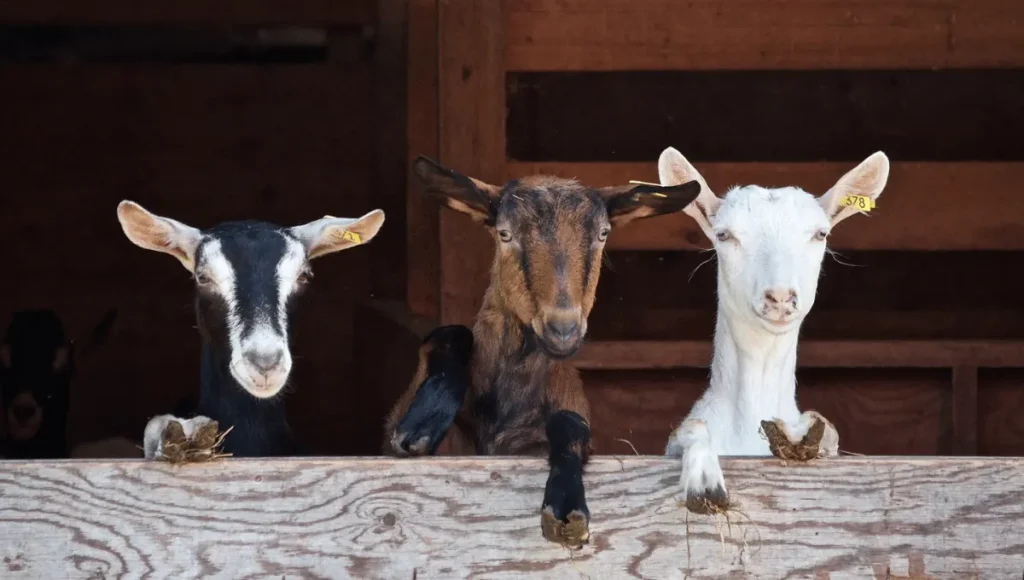
Feeding Kids (Baby Goats)
The diet of a baby goat, or kid, starts with colostrum, the nutrient-rich milk produced by the mother in the first few days after birth.
This is essential for building their immune system. After a few weeks, kids can start transitioning to hay and grains, but milk should still be a primary source of nutrition for at least three months.
Feeding Adult Goats
Adult goats thrive on a diet primarily composed of pasture and hay. Adult goats can also be supplemented with small amounts of grains, especially if they are pregnant or producing milk.
It’s important to monitor the weight and health of adult goats, adjusting their diet as necessary to maintain a healthy balance.
Feeding Pregnant or Lactating Goats
Pregnant and lactating goats have higher nutritional needs to support their babies and milk production. These goats should receive higher levels of protein and calcium, often provided through alfalfa hay and high-quality grains.
Additionally, they should have access to mineral supplements to ensure they receive all the necessary nutrients.
Creating a Balanced Diet for Goats
A balanced diet for goats consists of approximately 60-80% forage, 20-30% grains, and a small percentage of supplements or minerals.
Forage, such as pasture grasses and hay, should be the foundation of their diet, with grains and minerals supplementing their needs based on their age, reproductive status, and activity level.
A proper feeding schedule can help maintain a goat’s health. Providing forage throughout the day, with grains and supplements given during the morning or evening feeding times, helps balance their diet.
Make sure goats have continuous access to clean water and minerals to meet their daily needs.
Common Goat Health Issues Related to Diet
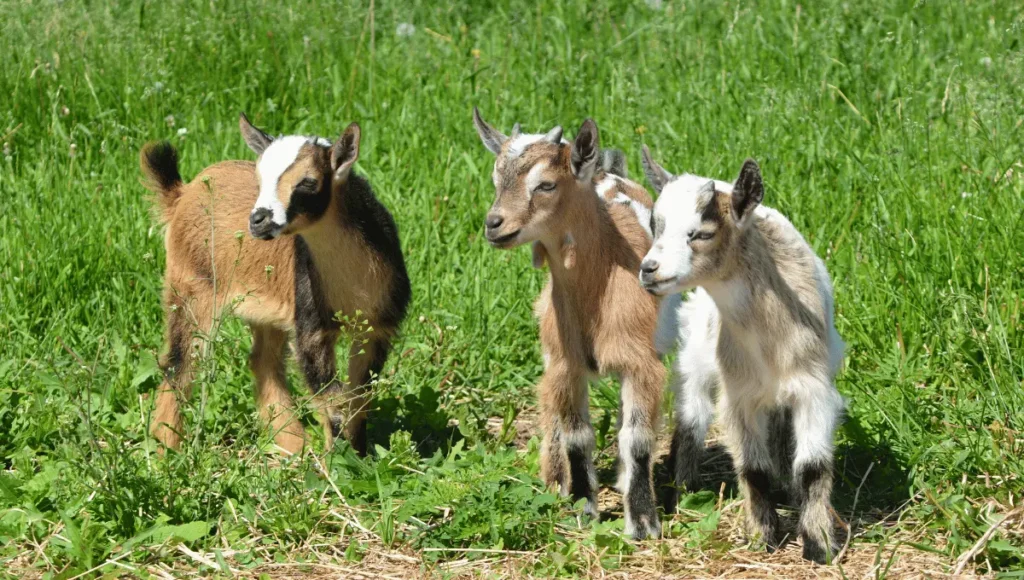
Bloat
Bloat is a common issue that can occur when goats consume too much grain or fresh, rich pasture. Symptoms of bloat include a distended belly, discomfort, and difficulty breathing.
To prevent bloat, avoid sudden changes in diet, and limit access to large amounts of grains or legume-rich pastures.
Mineral Deficiencies
Goats can suffer from mineral deficiencies if they don’t have access to a balanced diet. Symptoms include poor coat condition, weakness, and reproductive problems.
Providing goats with access to mineral blocks or loose minerals designed specifically for them can help prevent these issues.
Obesity and Underfeeding
It’s important to maintain a proper feeding balance, as goats can suffer from both obesity and underfeeding.
Obesity can lead to reduced mobility and health complications, while underfeeding can result in malnutrition and poor milk production.
Regularly monitoring a goat’s weight and adjusting its diet accordingly is key to preventing these issues.
Conclusion
- Understanding what goats can eat is essential to keeping them healthy, happy, and productive.
- A balanced diet consisting of forage, safe grains, vegetables, and the right supplements can make all the difference in the well-being of your goats.
- Avoid harmful foods and toxic plants, and tailor the diet based on the specific needs of kids, adults, and pregnant or lactating goats.
- With proper nutrition, goats will thrive in any environment, from farms to backyard settings.
FAQs
1. What is the best food for goats to eat daily?
Goats thrive on a diet that primarily consists of forage, such as pasture grasses and hay. Alfalfa, clover, and Timothy hay are excellent daily food sources. Fresh, clean water and access to a mineral block or loose minerals are also essential for their overall health. While grains and fruits can be given in moderation, forage should make up the majority of a goat’s diet.
2. Can goats eat fruits and vegetables?
Yes, goats can eat a variety of fruits and vegetables as part of their diet. Safe vegetables include carrots, cucumbers, and lettuce, while fruits such as apples, bananas, and pears are great occasional treats. Always remove seeds and pits from fruits, and feed them in moderation to avoid digestive issues.
3. What foods are toxic to goats?
Some plants and human foods are toxic to goats, including azalea, rhododendron, oleander, foxglove, and yew. Human foods like chocolate, caffeine, onions, garlic, and avocados should also be avoided. Always monitor what goats have access to and remove any harmful plants from their environment.
4. How much water do goats need daily?
Goats need plenty of fresh, clean water daily—typically between 2 to 4 gallons per day, depending on their size, activity level, and whether they are lactating. Providing continuous access to clean water is crucial for their health and digestion.
5. How can I prevent bloat in my goats?
To prevent bloat, avoid feeding goats large amounts of grains or fresh, rich pastures suddenly. Gradually introduce new foods into their diet and make sure they have a balanced intake of forage, grains, and supplements. Monitor them after dietary changes, and ensure they have access to fresh water at all times.
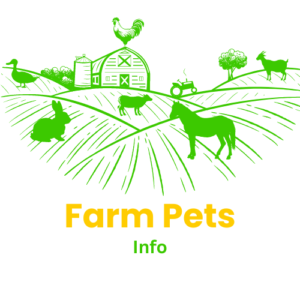
Pingback: Can Goats Eat Mango? A Complete Guide - Farm Pets
Pingback: Can Goats Eat Cucumbers? A Complete Guide - Farm Pets